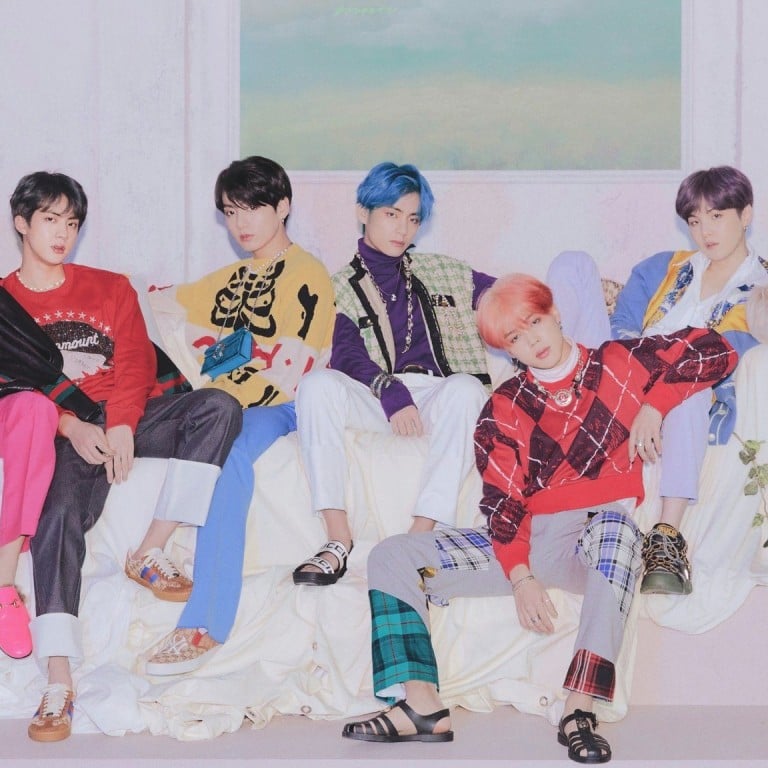
In tokenising BTS, the Grammys were not only crude but cruel – it needs the K-pop kings more than they need awards
- BTS performed towards the end of the night, even though they weren’t nominated for a main award and their category, which they didn’t win, wasn’t even televised
- In an era where no award is as powerful as the love and dedication of fans, the Grammys reaffirmed its lack of self-awareness regarding its importance
There’s a popular phrase among fans of K-pop group BTS: “What Yoongi wants, Yoongi gets.”
The key word here is that it’s what Min Yoongi – aka BTS rapper-songwriter Suga – wants, not what he needs. He sets goals that are dreams, not necessities. Which is one reason why BTS being denied an award at the 63rd Grammy Awards earlier this week was such a disappointment. It was something they desired and deserved, but it wasn’t something they needed. The band responded with disappointed acceptance, while looking towards the future.
With the Grammys itself only drawing in 8.8 million viewers on terrestrial television while a live stream hosted by BTS after the show attracted more than 7 million, one thing became clear: they were the star attraction, giving the Grammys a sure-fire way to boost viewership.
BTS have appeared at the Grammys for the last three years. In 2019 they presented H. E. R with the award for best R&B album, and their Love Yourself: Tear album was nominated in the category for best recording packaging, but lost to St. Vincent’s Masseduction. Last year they performed alongside Lil Nas X. This year, the South Korean septet performed on their own for the first time at the Grammys, with a thrilling rendition of their hit Dynamite that began with them performing on a duplicate of the set of the American awards show but ultimately ended with them showing off Seoul from a rooftop.
BTS have performed Dynamite numerous times during the past year on various awards shows, with multiple renditions available to watch online, so it’s not like they needed to perform the song again. That was all for the Grammys. It’s now painfully clear that the Grammys need the likes of BTS and their Army fandom to try to remain relevant this decade – but instead the show has reaffirmed its lack of self-awareness regarding its importance in an era where no award is as powerful as the love and dedication of fans.
There were, of course, performances by other nominated artists who did not win, but it went further with BTS. The Grammys, unlike most other music awards shows in the US these days, are not obliged to award the bestselling or most popular hits of the year, and those releases are often snubbed. Many artists, especially black ones, no longer participate due to perceived biases, and critics of the Grammys and fans of BTS took to social media to allege they were seeing xenophobia mixed with the Recording Academy’s historic dislike of anything related to boy bands.
Most observers realised the chances of BTS winning were low because of these perceived biases. But the way the Grammys disrespected BTS and Army as a way to boost ratings was doubly crass because of this: their appearance was promoted as a celebration of the group’s impact and a show of diversity at an event that has historically been criticised for lacking it. After the show, it was painfully obvious that the Grammys wanted BTS for a ratings boost and nothing else, disregarding their talent, artistry and worth as individuals. Instead, the band were diminished to the equivalent of television clickbait.
At this point, no award, no broadcast, no institution, can validate BTS’ worth beyond BTS themselves
Ultimately, those who stage the Grammys and those who vote as members of the Recording Academy are two separate groups. Several people associated with the former – including a former Grammy.com editor – posted on social media about the divide in the institution between those who saw value in BTS and those who didn’t.
“BTS was such a pain point when I edited Grammy.com,” Rachel Brodsky tweeted soon after the Grammys. “Any post about them did epic numbers and reflected where music’s going, etc. But the RA board – they really pushed back on our writing about BTS. For reasons I never fully understood, but seem obvious in retrospect.”
Hopefully, in future, those with their blinders on will cease to disregard BTS’ impact and recognise their worth. But such validation won’t mean anything as long as they continue to disrespect the band and their audience.
Yes, it would have been nice if BTS received an award they so clearly wanted. It would have been nice if the academy – still revered by some for its artistic judgment – would select BTS’ music for an award, recognising not only their talent but that a South Korean act, the first ever Korean group (and second ever Korean artist) nominated for a Grammy, is now part of the American music mainstream. The band’s impact on the zeitgeist is undeniable, with or without the award.
Screenshots of a 2020 interview – where Suga spoke about his hopes for BTS and the Grammys – circulated soon after the group lost: “As a team I want to do a performance next year! And win an award the year after that!” The rapper’s words about the band’s success have proved prophetic in the past, so fans rallied around the clip, hoping it predicted a win for the group in 2022. And as long as BTS want it, it would be nice if such an award came their way. But at this point, no award, no broadcast, no institution, can validate BTS’ worth beyond BTS themselves.
